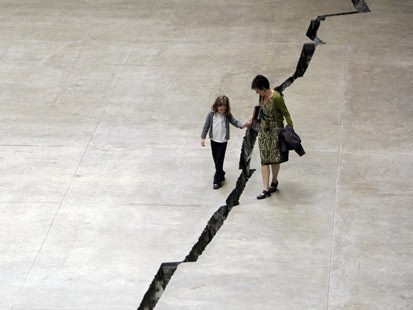20.1.08
De vuelta a mi viejo, pero no tan viejo hogar.
A mi llegada reconocí el ambiente y me sentí tranquila, relajada. Respiré y disfruté mi alrededor. En el trayecto del metro del aeropuerto al centro, yo no era una viajera sino una simple espectadora. Había un asiento desocupado enfrente de mí. Unos instantes después, un hombre de tez morena, estatura baja y con rasgos andinos se sentó ahí. Sus ropas eran de un trabajador de la constucción, su aspecto cansado pero de esas personas que la naturaleza las han hecho sabias. Me pareció que sentía que cargaba el mundo sobre sus hombros, sí, como el Apolo, pero en este caso parecía que él no podía con el peso. El hombre empezó a mirarse las manos, como explorandolas, de un lado y del otro, por el frente y las palmas. Se las frotaba y las tocaba. Sus manos eran grandes y gruesas, de esas manos que son fuertes, ásperas, consistentes para el trabajo duro manual, talvez trabajó en el campo. Cuando se las tocaba, parecía por su cara que le dolían, que sus herramientas de trabajo no le estaban respondiendo como antes. Que esas manos le sostenían a él y a toda su familia, Parecía que les agradecía y les hablaba "respondanme como antes, más en estos momentos, con la edad que tengo y en un país que no es el mío, en el que busco una vida mejor de la que tenía de donde provengo". Me pareció profunda la conexión. Creo que empezaré a comunicarme con mi cuerpo.
19.1.08
11.1.08
7.1.08
4.1.08
2.1.08
DORIS SALCEDO - SHIBBOLETH

"A shibboleth, according to the Oxford English Dictionary, is 'a word used as a test for detecting people from another district or country by their pronunciation; a word or sound very difficult for foreingers to pronounce correctly.' It is, therefore, a way to separating one people from another. The word refers back to an incident in the Bible. The Book of Judges describes how the Ephraimites, attempting to flee across the river Jordan, were stopped by their enemies, the Gileadites. As their dialect did not include a 'sh' sound. those who could not say the word 'shibboleth' were caputured and executed. A shibboleth is a token of power: the power to judge, refuse and kill. What might it mean, however, to refer such violence in a museum of modern art?
First, and most obviously, the contemplative nature of such a venue allows the gesture to resonate in its widest sense. Walking down Salcedo's incised line, particularly if you know about her previous work, might well prompt a broader consideration of power's divisive operations as encoded in the brutal narratives of colonialism, their unhappy aftermaths in poscolonial nations, and in the stand-off between rich and poor, nothern and southern hemispheres.
If Shibboleth speaks openly to our moment, it is also concerned with an archeological sense of history. Indeed, Salcedo infers that the two are fundamentally connected. Look down into the crack, and you see not Tate Modern's foundation but a carefully constructed concrete cast formation, embedded with chain-link wire fence. For Salcedo, the crack reveals a 'colonial and imperial history [that] has been disregarded, marginalised or simpley obliterated... the history of racism, running parallel to the history of modernity and... its untold dark side.'
Tate Modern, of course, is housed in a former power station, one commissioned in 1947 to assist in the powering and reconstruction of post-war London. This was the very moment that the city was becoming increasingly multicultural as a result of labour-migration movements in the decolonising twilight of the British Empire, and the schisms and exclusions of postcolonialism were already beginning to be played out. Bakside Power Station was established alongside the welfare state, which itself was designed to assist in creating multiracial harmony. After being decommissioned in 1981 by the Conservative government, it sat derelict until reopening as an art gallery in 2000. Digging beneath the surface, Salcedo reconnects the building to these colonia and postcolonial histories, to the operations of power and the ideological creation of artificial notions of difference and otherness.
Modernity, as embodied by Tate Modern's collection of modern art, is implicated too. 'Modernity,' writes Salcedo, 'is seen as an exclusively European event in which the self-cultivation of the human mind through the exercise of reason and the study of the classics had as its main purpose the creation of a homogenous, rational and beatiful society... in this narration, colonial and imperial history has been disregarded, marginalized or simply obliterated.' Modern art, through its advocacy of what Salcedo calls 'an ideal of humanity so restrictedly defined that it excluded non-European peoples from the human genre,' can be said to have perpetuated a potent stereotype or separation: a shibboleth of its own, which the excluded have no hope of answering correctly."
Text by Martin Herbert. Tate Modern
Subscribe to:
Comments (Atom)
